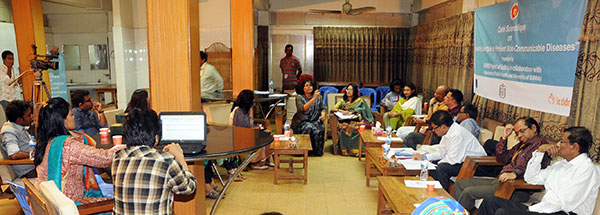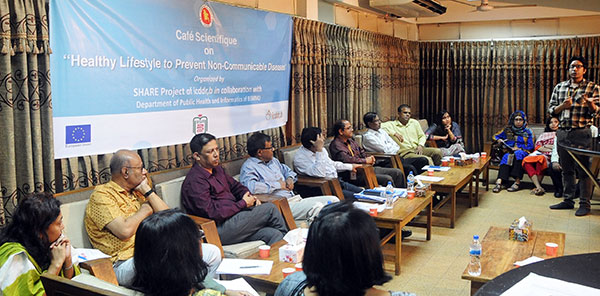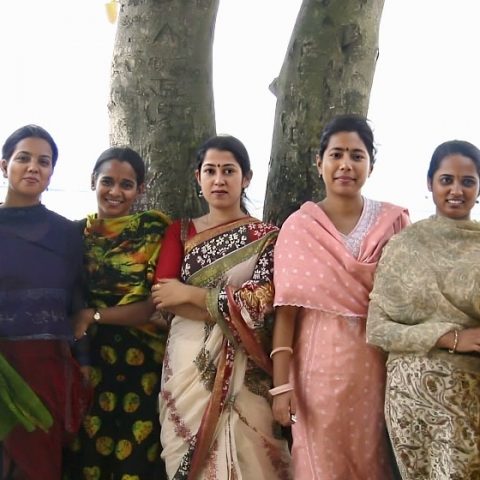Although structured moderation is important for communication between specialists, it can also stifle the spontaneous sharing and open engagement necessary for genuine scientific knowledge sharing to the general public. Café Scientifique is a model for public engagement between scientists and the general public that has been successfully implemented in developed countries. It gathers non-specialists and experts in an environment that encourages openness and facilitates interaction, creating a bidirectional flow of information necessary for genuine public engagement. In 1998 the first Café Scientifique was held in Leeds, UK. Café Scientifique can be held at the cafeteria of any institution, at a public gathering place or any well- known community space. By hosting a stimulating sharing of views over tea/coffee around health issues in an informal setting, icddr,b has recently initiated Café Scientifique in Bangladesh.
The European Union supported SHARE (Strengthening Health, Applying Research Evidence) project of icddr,b recently hosted a discussion in the spirit and format of Café Scientifique. The discussion, titled “Healthy Lifestyle to Prevent Non-Communicable Diseases (NCDs)”, was held on 4th March 2017 at the BSMMU teacher’s lounge, in collaboration with the Department of Public Health and Informatics. The discussion sought to promote engaging dialogue and effective health communication between different stakeholder groups, researchers, health professionals and the general public. Prof. Dr. Md. Shafiqul Islam, Head of Epidemiology at NIPSOM, moderated the event.
In 2016, the SHARE team continued to explore avenues for public engagement around health issues in Bangladesh. The team organised a public engagement dialogue in Monpura – one of the most remote islands in Bangladesh, and also in a neighboring district on adolescent health issues bringing together school students, teachers, guardians, medical practitioners and researchers. Interactions were conducted at rural tea stalls, and a facilitated dialogue was hosted for visitors at a national book fair. Public engagement in health should be evaluated based on the immediate outcomes of the engagement process. By this metric, the degree of positive response and participation from the general public and stakeholders has been inspiring so far. The informal setting of Café Scientifique allowed researchers and programme directors to hear a number of different perspectives from stakeholders and the general public, deepening their shared understanding of health issues through multi-party communication. Ultimately, these dialogues can guide the design of more nuanced health policies that can effectively meet the needs of disparate stakeholders.
Although more evidence is needed to accurately evaluate the impact of public engagement on the health sector, its importance continues to grow. Many development partners are now encouraging increased public participation in the design of health policy. There is a growing demand on policy makers to cede power to mass involvement and enable continuous engagement. With the broader objective of encouraging evidence-informed health policy in Bangladesh, the SHARE project has engaged with stakeholders to incorporate their perspectives in policy design, and has successfully involved government partners in engagement processes that foster greater trust between people and the state. In line with the principles and strategies of National Health Policy, public engagement models like Café Scientifique can create a platform for collaboration between common people, health managers, policy makers, researchers and other relevant stakeholders.
The diversity of viewpoints can make Café Scientifique discussions dynamic and engaging. When Dr. Iqbal Anwar, SHARE Project Director and Scientist of icddr,b, pointed out the importance of translating research evidence on NCDs prevention to the design of new health policies, a counterargument came from Dr. Md. Khalequzzaman, Assistant Professor of BSMMU, who feels that these research and policy issues are redundant when more fundamental interventions are needed to raise basic health awareness. Several participants talked about the role of institutions in promoting healthy lifestyles. IEDCR and icddr,b participants emphasized the importance of awareness programmes and policy interventions to encourage reduced intake of salt and sugar. Several mass media representatives shared their views on the important role played by the media in promoting healthy lifestyle to prevent NCDs, such as heart disease, stroke, diabetes, cancer and chronic lung disease, which are responsible for half of Bangladesh’s annual mortality and account for 61% of the country’s disease burden. The SHARE project is working to strengthen evidence-informed health policy making through multi-channel capacity building programmes. With respect to this broader goal, Café Scientifique discussions can foster knowledge sharing to improve the understanding of health issues like NCDs, and help to shape more informed decision-making processes in the long run.
Lt Colonel (Dr.) Nazmul Huda Khan, a participant from NIPSOM, summarized the event well- ‘Such interactions with health experts and researchers can bring the mass audience closer and understand the health issues in an easy way. This initiative will help in advocating for healthy life style and promote fruitful dialogue in the health sector’. This is indeed the real purpose of Café Scientifique, which the icddr,b SHARE project is planning to anchor within public health institutes across Bangladesh, in the hope of facilitating greater public engagement between sector experts, students, teachers, scientists, researchers, policy makers, health professionals and the general public.



